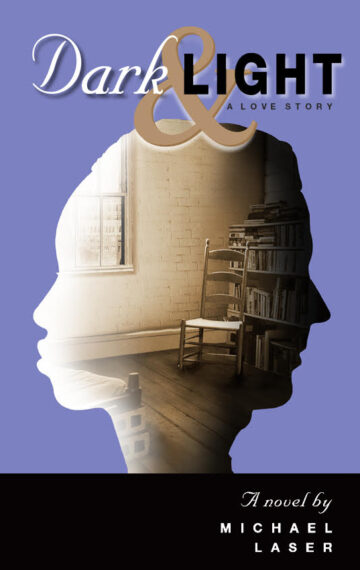A Novel for Adults (2006)
A white man and a black woman discover the depth of their differences, and an unexpected bond, in this urban drama.
Edmund, long-divorced and lonely, offers shelter to Careese, who is temporarily homeless. Good intentions on both sides give way to mutual distrust and resentment — but what begins as a clash of language and culture turns into something else entirely.
Told in the two distinct voices of its protagonists, this novel cuts to the bone in dissecting Edmund’s and Careese’s hidden prejudices, faults and strengths. As their attitudes change, their seemingly simple story becomes a complex exploration of America’s unhealed wound.
•
DARK & LIGHT is a moving, convincing, and entirely unsentimental story of a love that bridges ethnic and social divides; that succeeds even when — perhaps even because — it doesn’t triumph.
– John Barth
…brutally honest about the difficulty of bridging the racial gap and the assumptions that even well-meaning blacks and whites make about one another.
– Library Journal
Excerpt:
Over dinner on Wednesday, Careese mentioned that this would have been her father’s fifty-second birthday. All day long, she said, she’d been thinking about the nights when they used to play cards and pass a bag of potato chips back and forth. She was hoping Edmund might play Crazy Eights with her after supper, in her father’s honor. She’d even bought a bag of potato chips.
Edmund considered card-playing the most useless waste of time imaginable, and had gone more than twenty years without opening the deck in the kitchen drawer. After what Careese had said, though, he couldn’t refuse…
“How long ago did your father pass away?”
“Going on two years. Two years December twelfth.”
“It must have been hard for you.”
Tears collected in her eyes. The ease with which she contacted her grief awed him.
“That was the worst time in my life. Everything else that was bad, at least it was still life. But when he passed, it was final. I couldn’t accept it, that I wouldn’t ever see him again.”
She wiped away the tears, and played the Jack of clubs. He put down a three of clubs to match the suit.
“You must have loved him a lot.”
“We had a closeness that nobody couldn’t touch. When I got sick with the strep, he cooked soup for me, made sure I was warm enough. He brought the TV into the room so I could watch my cartoons. Just sitting on the couch together was fun for us—we used to watch wrestling at night, and I would always say it was phony, and he’d say, ‘No it’s not!’ Cause it’s a skill, they have to go to school and learn how to flip each other without getting hurt.”
Her love reminded him of its opposite, Kristen’s bristling, contorted anger. The contrast hit him like a bat in the face.
“He came from the street, he wasn’t fancy like Mom. But he weren’t rough. He had a comfortable, relaxed way. Everybody liked to be around him… But I’ll tell you what he liked better than anything. Fishing. That’s some of my best memories.”
“He took you with him?”
“Yeah, he took us upstate sometimes, to a lake, and rented us a rowboat. That was his peace on earth.”
“What kinds of fish did you catch?”
“From the lake, I don’t remember. When we fished the Hudson River it was striped bass, white perch. And eels—that was gross. My little brother used to whine and complain when it came time to clean the fish.”
“I’ve never cleaned a fish in my life. I wouldn’t know how.”
“It’s not that hard. You just take the knife and rub the scales off, go the opposite way of the scales. They pop all over. Then you slice the fish down the belly side—don’t cut it all the way in half, just open it like you do a hot dog bun. Then you clean the insides out. And then you cut the head off, and you wash it.”
As she talked, he eased into a pleasant, trancelike state, as if he were a small child and she were reading him a bedtime story. He felt a pang of disappointment when she stopped.
Comments:
During the 1990s, I worked at The Fortune Society, a nonprofit that helps people who have just gotten out of prison. There I met people unlike any I had ever known: people who had grown up in the toughest neighborhoods of the city, committed felonies, served time, and done everything they could to change their lives. At first I was stunned by how rough these people were; over time, I came to admire and love many of them. Edmund’s changes of attitude in Dark & Light parallel my own at The Fortune Society.
In the course of my employment at Fortune (where I wrote grant proposals and annual reports), I interviewed many of my co-workers about their lives. I transcribed these interviews with painstaking care, to preserve a record of their voices on paper. Careese’s voice is closely based on some of these transcripts.
While working on this book, I worried that I would fail to do justice to her voice; that, by focusing on Careese’s problems, I would be accused of racism. Early on, I tried to recruit a black woman as a co-author, but that effort failed, and so I was left on my own, to endlessly revise and try to get the voice right–as the old joke about the sculptor goes, chipping away at everything that didn’t look like the subject.
Aren’t people all the same under the skin? Does it hurt or help to probe the points of difference and hostility between them? My feeling is, you can’t really accept people until you become deeply familiar with them, and that means recognizing the differences and working through the fact that the differences can be irritating.
